The eradication of rodents on Australia’s Lord Howe Island, expected to take place this year has been delayed until 2019. The planned eradication will afford the inhabited island’s breeding seabirds, such as Flesh-footed Puffinus carneipes and Wedge-tailed P. pacificus Shearwaters, protection from Black Rats Rattus rattus and House Mice Mus musculus.

Flesh-footed Shearwater, photograph by Barry Baker
A Facebook post from the Lord Howe Island Board with statements from Penny Holloway, Chief Executive Officer and Jaclyn Pearson, Assistant Project Manager (Community) on its rodent Eradication Project follows in full:
“Today [20 March] at a Public meeting, the LHI Board voted to delay implementation of the LHI Rodent Eradication Program (REP) until winter 2019, with a change in methodology to an increase in bait stations in the settlement area.
The project is still viable and able to achieve its objectives to remove rodents and restore the islands. The decision to delay was based on two factors, firstly the new application for a Minor Use Permit from the Australian Pesticides and Veterinary Medicine Authority (APVMA) is still under assessment. Despite representations about a decision being made expeditiously, the latest advice from the APVMA is that a decision on the new application may not be made until May 2018.
Without the APVMA licence in hand, we are unable to plan final logistics that meet the approval conditions. Delays in receiving the permit increase the risk of failure as the operation cannot be planned to the standard required. This made it impractical to proceed with the project in the current time frame.
Secondly, although there is a high level of support for the REP, there continues to be opposition within the community. Ongoing consultation has shown that whilst some residents are opposed to the REP, they would allow access to their property for baiting upon commencement of the project. Several residents are refusing to allow access for baiting during the REP, however based on feedback from some members of the community, an acceptable compromise may be to change the methodology in the settlement area to more bait stations. This will largely reduce bait in the open of the settlement area, and therefore reduce people’s concerns relating to this aspect. It may also present an opportunity for further discussions regarding livestock and poultry. However this change to the methodology requires more time and resources on the ground during the eradication and more time invested in planning, to ensure the project meets the required standards.
The decision was therefore made by the LHI Board (with a 5:2 vote) to delay the implementation of the LHI Rodent Eradication Program (REP) until winter 2019, with a change in methodology to an increase in bait stations in the settlement area.
This may be disappointing and surprising news for many who were hoping the project would be implemented this year, but now, more than ever we need your support and positivity to focus on our conservation goal of removing all rodents from Lord Howe Island. Like me, you will understand that when operational risks are too high, it is best to take more time to reduce the risks and be as prepared as possible to give any project the highest chance of success.
The REP team want to emphasise that the project is still viable and a wonderful opportunity for the island. The funding is in place for another year and we are committed to finding acceptable compromise for community members regarding concerns on the baiting methodology. I have listened to resident's concerns for the past three months and I am sure we can work together to find common ground, because we all agree that rodents need to be removed. I am certain with more bait stations replacing hand broadcast, I can help you to feel better about the safety of your family and pets - replicating the methods you are currently using.
I cannot change the methodology of the aerial baiting and I am happy to continue to talk to you about why. I will also continue to alleviate concerns regarding the myths that have been so deep-routed for many years – including continuing to explain how brodificoum is practically insoluble in water and therefore why the Toxicologists, the NSW Chief Scientist and Dr Frank Reed back this methodology. With the legacy of conservation on Lord Howe you should be proud of your continuing efforts – let’s just keep going and do it to the best of our ability. Please contact me for further information at anytime”
Access previous ALN postings on the Lord Howe eradication project here.
John Cooper, ACAP Information Officer, 26 March 2018

 English
English  Français
Français  Español
Español